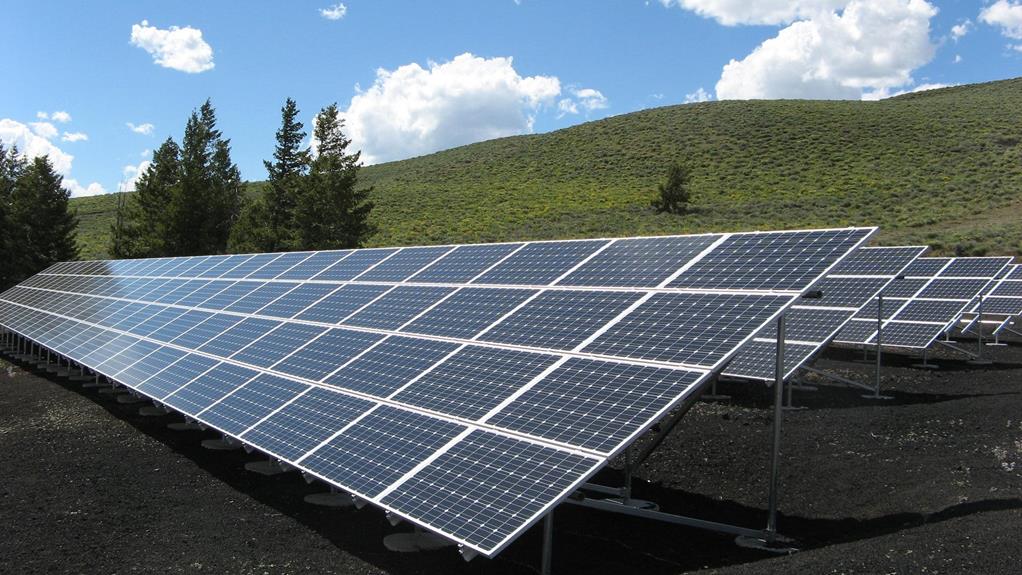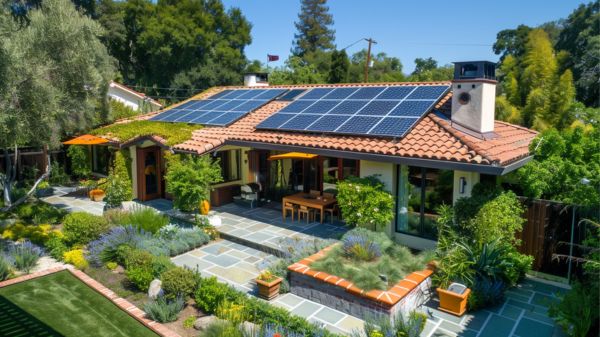Are you ready to join us on a journey towards sustainable living? Let’s explore the exciting world of maximizing renewable energy benefits!
By making a few simple changes in our daily lives, we can make a huge impact on our planet and our future. Coincidentally, these changes also bring us numerous benefits! From saving money on energy bills to creating a healthier environment for ourselves and our communities, the advantages are endless.
By prioritizing energy-efficient appliances, optimizing our heating and cooling systems, and harnessing the power of renewable energy sources like solar and wind, we can not only reduce our carbon footprint but also create jobs and contribute to a more sustainable world.
Together, let’s embrace the power of renewable energy and make a difference for generations to come.
Advantages of Renewable Energy
Our research has shown that the advantages of renewable energy are substantial and can significantly impact our lives for the better. Transitioning to renewable energy solutions is a crucial step towards sustainable living.
By utilizing renewable energy technologies, we can reduce our impacts on the environment and promote a cleaner, healthier future. One of the key advantages of renewable energy is its ability to reduce air pollution and improve public health by eliminating the need for burning fossil fuels.
Additionally, renewable energy systems offer the potential for energy independence and diversification of economies by harnessing the power of renewable energy sources available in all countries. Furthermore, the decreasing cost of renewable energy technologies has made it the cheapest power option, which not only benefits individuals and businesses but also contributes to economic growth and poverty alleviation.
To maximize the advantages of renewable energy, the development of efficient energy storage systems is essential to ensure a consistent supply of clean energy, even during periods of low renewable energy generation.
Economic Benefits of Renewable Energy
To fully understand the potential of renewable energy, we must explore the economic benefits it brings to our society as a whole.
Renewable energy offers numerous advantages that contribute to sustainable living and maximize its benefits.
Firstly, renewable sources such as solar and wind power are cost-effective options. The costs for these technologies have significantly decreased over the years, resulting in reduced energy costs for consumers.
Additionally, investments in renewable energy can lead to substantial cost savings over time. By reducing the need for fossil fuel subsidies and minimizing external costs like health and environmental damages, renewable energy contributes to significant economic benefits.
Moreover, the transition to renewable energy creates new job opportunities and supports inclusive economic growth. Every dollar invested in renewables generates three times more jobs than in fossil fuel industries.
These economic benefits not only support sustainable living but also foster a sense of belonging and shared prosperity within our society.
Environmental Benefits of Renewable Energy
Renewable energy offers significant environmental benefits, contributing to a cleaner and healthier future for all. By harnessing renewable sources like solar power, we can reduce our reliance on fossil fuels and minimize our carbon footprint. This transition to clean energy sources has a direct impact on reducing greenhouse gas emissions, which are responsible for climate change.
The environmental impacts of renewable energy are far less detrimental compared to traditional energy sources, such as coal or oil. By adopting renewable energy, we can improve air quality, reduce air and water pollution, and mitigate long-term health issues caused by pollution.
Additionally, renewable energy helps conserve natural resources, as it provides a sustainable and reliable energy source that isn’t subject to geopolitical concerns. Embracing clean energy is crucial for achieving a sustainable future and protecting our environment for generations to come.
Social Benefits of Renewable Energy
One important aspect of renewable energy is its ability to provide us with numerous social benefits.
Transitioning from fossil fuels to renewable energy sources such as solar and wind energy can significantly reduce carbon emissions and greenhouse gases, contributing to a cleaner and healthier environment. This improvement in air quality can have a direct positive impact on public health, reducing respiratory illnesses and improving the well-being of communities.
Moreover, the shift towards renewable energy promotes sustainable living and energy security. Investing in renewable energy creates more jobs compared to fossil fuel industries, leading to inclusive economic growth and poverty alleviation.
Additionally, the reduction in external costs like health and environmental damages improves the overall quality of life, making renewable energy a crucial component for a more socially and economically prosperous society.
Long-Term Sustainability With Renewable Energy
Our commitment to maximizing the benefits of renewable energy for sustainable living extends to ensuring its long-term viability.
Transitioning to renewable energy sources, such as solar power, is a crucial step towards achieving long-term sustainability. By reducing our reliance on fossil fuels and installing solar panels and other solar energy infrastructure, we can significantly reduce greenhouse gas emissions and carbon emissions.
Renewable energy is a renewable source of green energy that has the potential to provide 65% of the world’s total electricity supply by 2030. Not only is it a cost-effective solution, but it also creates three times more jobs than the fossil fuel industry, contributing to long-term economic sustainability.
Embracing renewable energy is essential for a sustainable future and a greener planet.
Conclusion
Maximizing renewable energy benefits is crucial for sustainable living. Not only does it contribute to energy savings and cost-effectiveness, but it also creates jobs and addresses climate change and air pollution.
One interesting statistic is that the renewable energy sector employed over 11 million people worldwide in 2018, with solar energy being the largest employer. This highlights the economic and social advantages of renewable energy in achieving long-term sustainability.




